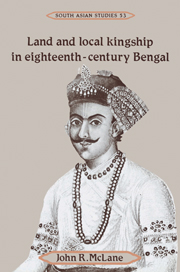Book contents
- Frontmatter
- Contents
- List of tables
- Preface and acknowledgments
- List of abbreviations
- Select glossary
- Map of southwest Bengal
- Part I Bengal
- Part II Burdwan
- 6 Mughal Burdwan and the rise of the Burdwan raj
- 7 Burdwan's expansion
- 8 The Maratha invasions, 1742-1751
- 9 Zamindars and the transition to Company rule
- 10 The famine of 1770
- 11 Revenue farming, 1771-1777
- 12 Zamindari family politics: the Burdwan raj, 1770-1775
- 13 The politics of Burdwan family debt and marriages, 1775-1778
- 14 Testing the limits, 1778–1790
- 15 Burdwan under the Decennial and Permanent Settlements
- 16 Patnis and the elusive quest for independence and security
- 17 Conclusion
- Bibliography
- Index
- Cambridge South Asian Studies
16 - Patnis and the elusive quest for independence and security
from Part II - Burdwan
Published online by Cambridge University Press: 13 October 2009
- Frontmatter
- Contents
- List of tables
- Preface and acknowledgments
- List of abbreviations
- Select glossary
- Map of southwest Bengal
- Part I Bengal
- Part II Burdwan
- 6 Mughal Burdwan and the rise of the Burdwan raj
- 7 Burdwan's expansion
- 8 The Maratha invasions, 1742-1751
- 9 Zamindars and the transition to Company rule
- 10 The famine of 1770
- 11 Revenue farming, 1771-1777
- 12 Zamindari family politics: the Burdwan raj, 1770-1775
- 13 The politics of Burdwan family debt and marriages, 1775-1778
- 14 Testing the limits, 1778–1790
- 15 Burdwan under the Decennial and Permanent Settlements
- 16 Patnis and the elusive quest for independence and security
- 17 Conclusion
- Bibliography
- Index
- Cambridge South Asian Studies
Summary
Before the Decennial and Permanent Settlements, the overwhelming majority of the inhabitants of the modern districts of Bankura, Birbhum, Burdwan, Howrah, and Hughli had lived under one of three kortas or masters: the rajas of Birbhum, Bishnupur, or Burdwan. Subordination to a major zamindar was part of the natural order. These three zamindars and their amla had dominated their territories, although with decreasing autonomy since 1757, and had distributed rent-collecting rights among their principal subjects. They had performed useful functions for the local gentry and the rest of the subordinate population. They stood between the state and their subjects and pleaded with the state when seasonal calamities prevented renters from meeting the state's demands. In years of poor harvests, the zamindars reduced their collections and borrowed from bankers or even spent their moshaira to pay the district's revenue. The zamindars commanded the local militia which escorted treasure, guarded the kacharis, broke up local combinations against rent demands, and drove off the chuar incursions from the western hills. They appointed the village chaukidars and paiks who aided in rent collection and village law enforcement. They supervised courts in which disputes over property and violation of behavioral norms were adjudicated. They gave rent-free land to Brahmins who performed the necessary rituals, upheld the rules of civilized behavior, and taught reading and accounting. They employed local persons to manage the collections and work in the zamindari offices.
- Type
- Chapter
- Information
- Land and Local Kingship in Eighteenth-Century Bengal , pp. 287 - 305Publisher: Cambridge University PressPrint publication year: 1993



